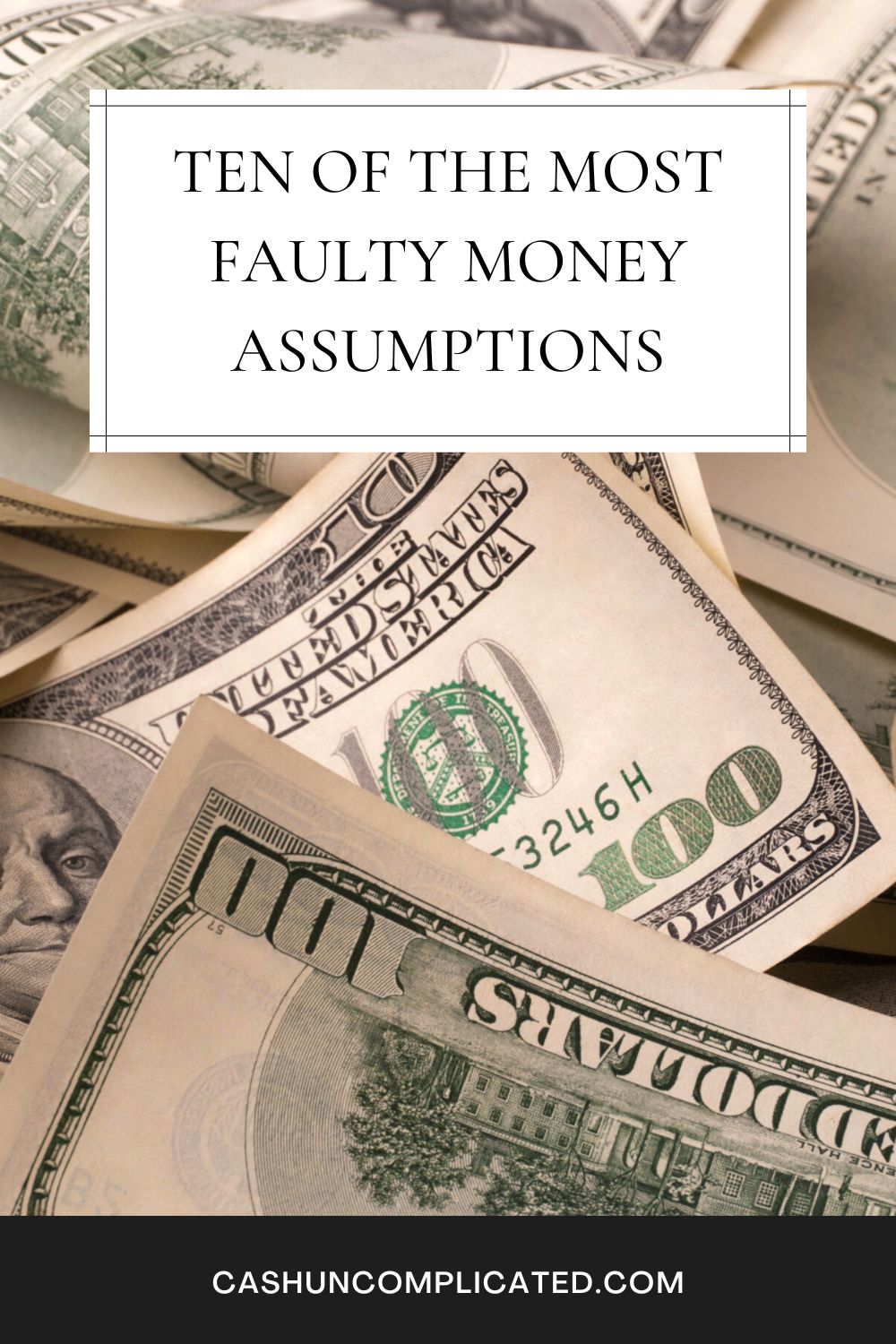I wrote about it in my book Cash Uncomplicated, but it bears repeating. I was filled with faulty money assumptions and it heavily impacted my personal finances in a very negative way. I went through years and years of living paycheck to paycheck and making excuses as to why I wasn’t getting ahead.
The silver lining in all of it was that my mistakes inspired me to educate others so they could hopefully avoid the same pitfalls as I faced. Without those mistakes I never would have written a book, started my blog, or appeared on multiple podcasts. So I guess it was a blessing in disguise, but it came with many tough lessons and lean years.
What Are Faulty Money Assumptions?
Faulty money assumptions are something I am all too familiar with. They are a mindset about money that are quite honestly–just wrong. Faulty money assumptions are a set of beliefs that are often based on incorrect opinions taken as facts, media sensationalism, and bad advice from others.
Where Do Faulty Money Assumptions Come From?
There is no one place because faulty money assumptions come from a lot of places. For most people, they start during childhood. Maybe it’s parents arguing or complaining about money, an uncle spewing misinformation, or an older sibling giving bad advice about personal finances.
Faulty money assumptions also come from many other common places such as:
- Social media
- The mainstream media
- Family and friends
- Co-workers
They are everywhere and it’s important to closely guard your mind against them.
Faulty Money Assumptions
There are lots of faulty money assumptions. By lots, I mean probably in the hundreds or thousands. To keep this post a reasonable length, I’m going to list some of the most impactful ones. And many of these faulty money assumptions are ones that I held for a long time and sincerely believed.
Number 1: The “I Can’t Because…”
“I can’t because…” inflicted me for many, many years. It was an assumption and excuse that kept on giving (in a negative way of course). “I can’t because…” is the gateway to a thousand excuses.
Give anyone a long enough amount of time and they can find a whole slew of reasons why they can’t succeed. It’s a faulty money mindset and excuse generating machine. I added it first on my list because eliminating this assumption is one of the most powerful things anyone can do to improve their personal finances.
Number 2: It’s Impossible to Save and Invest
The second faulty money assumption is also one that inflicted me for years. I didn’t think I had the ability to save and invest. And I’m not exactly sure where this came from because I don’t remember anyone directly telling me this. Maybe it was from hearing it now and then or listening to people around me complain about their financial situation.
The truth is that saving and investing is a possibility for everyone. And there are two tools that come front of mind. The first is paying yourself first. Which means just like it sounds–paying yourself before anything else. That includes before the bills come due.
When you pay yourself first, you’ll find a way to live off the rest of your money. Almost everyone I’ve talked to about paying themselves first state they missed the money at first but after a couple months they barely even notice. It takes getting started.
The second strategy that comes to mind goes hand in hand with paying yourself first. That strategy is automation. Rather than manually invest your money every month, automate by setting up your bank account to automatically distribute a portion of your income to investments.
It’s almost like direct deposit to savings and investments. Then you live off the rest and the saving and investing is already taken care of for you.
Number 3: You’re Either Good With Money or You’re Not
Directly related to the last section about not being good with money is the fixed mindset that you’re either good with money or not. That is a faulty money assumption. Money, just like anything else at life takes time, effort, and practice to be good.
Imagine someone not picking up a basketball for five years, taking a few shots, missing those few shots, and then saying they aren’t good at basketball. Most people would say that’s a ridiculous statement. Yet, many people put almost no effort towards improving their financial skills and then say you’re either good with money or not.
Being good with personal finance is a skill. It doesn’t come naturally for most people and it takes practice and effort. Where you are today isn’t where you are going to be a year from now, or five years from now.
I’ll use myself as an example. All throughout my twenties and into my early thirties, I was a disaster with my personal finances. But once I began to make an effort to learn and get better, things changed for the positive. My mindset is to continue to get better by attending conferences, getting with the right people, reading books, and more.
Number 4: There’s Nowhere to Learn About Money
The next of the faulty money assumptions is there is nowhere to learn about money. Here’s the way I see it. We live in one of the best times of all of human history to learn about new things, including money. There is an abundance of resources and opportunities available to anyone with a computer or a phone.
These are just a few of many ways to learn about money:
- Books
- Podcasts
- Masterminds
- Conferences
- Mentors
- Videos
- Experience
Let’s use an example of someone wanting to learn more about saving and investing their money. Maybe it’s someone in their late twenties who decides they want to improve in this area because they haven’t saved and invested much up to this point.
This person could start by reading a book like The Automatic Millionaire, Set for Life, or The Richest Man in Babylon. They could then listen to podcasts like Bigger Pockets Money or Choose FI. From there maybe watch YouTube videos or even attend a conference. These are all easy to do and cost very little money.
Many of the things on the list are free such as podcasts and videos. And books and other paid content are typically very inexpensive, especially related to how much value they are bringing.
Number 5: The Little Things Don’t Matter
In personal finance, the little things matter. Not because there is a high monetary value attached to everything but it’s about creating habits, structure, and routine. The habits you form with the small things carryover to the big things.
Here’s what I mean. Let’s take something like value-based spending, the concept of only purchasing what you really need or truly value. Buying a small trinket for five dollars that has no value to you is a direct violation of the value-based spending principle. So is buying a car you don’t really value for $40,000 versus a car that’s a third of the price that will just as easily get you from point A to point B.
Doing the little things well gives you the practice you need to develop the skills for the big things. Then when the big things come up like housing, transportation, and food–the skills and habits are already developed.
In addition, doing the little things well is like maintenance for your mind. It helps you continue the positive money habits so that whether it’s small or large, you’ll already have the skills.
Number 6: I’m Not Good With Money
“I’m not good with money” is a direct quote from yours truly. I used to say this all the time. Not only is it one of the faulty money assumptions, but it was also an excuse in my case. I was saying this because I didn’t take the time and effort to learn about money.
To be honest, I had no idea whether I was good with money or not. I had no idea because I had never tried and never made the effort. How can you know how good you are at something if you don’t try?
It wasn’t until years later that I realized this was an excuse and stopped saying it. Excuses and “giving reasons” feels good at the time but it actually stalls your progress. Nothing can get done if you allow excuses to interfere and get in the way.
When we make excuses, you are giving your mind permission to find reasons why you couldn’t get something done. But when you set your mind to get something done, you will find ways to accomplish what you need to.
Number 7: Credit Cards Can Are an Emergency Fund
Next on the list of faulty money assumptions is that credit cards are an emergency fund. Before diving too deep on this topic, let me give some background. My opinion on credit cards, and something I wrote in my book is that credit cards need to be paid off in full every month.
That means credit cards can be used for emergencies, but are not designed to be an actual emergency fund. Here’s the distinction. In an emergency, there’s nothing wrong with paying with a credit card. But the money is also available in an emergency fund and the card will be paid off during the next billing cycle.
What can’t happen is the card is used for an emergency when there’s no money in an emergency fund to cover the monthly bill. Doing it this way is using the credit card as an emergency fund, and that totally defeats the purpose. That means the cardholder is going into debt and paying interest on whatever the emergency was.
So, if $2,500 was put on the credit card to cover an expensive car repair, interest will be paid on that amount if it’s not paid off. That turns a $2,500 emergency into a possibly $3,000 plus emergency, depending on how quickly the card is paid off.
Related:
Number 8: The Wealthy Inherited Their Money or Got Lucky
Ok, be truthful here, has this ever happened to you? You go to a party at a friend of a friend’s house–and it’s really nice. Maybe it’s up in the hills, on a very large plot of land, or has an ocean view. Either way it’s really nice.
The people hosting the party are nice enough but when you get home you wonder to yourself how they got the money to buy a house like that. It crosses your mind that maybe they inherited the money or got lucky somehow. Maybe they won the lottery? Or someone gave them a sizable chunk?
It’s natural human behavior to give credit to ourselves when things go well and apply external factors to others when they are doing well. Recognize the human propensity for faulty assumptions.
Instead of thinking that others inherited their money or got lucky, assume they worked for it, invested wisely, and made smart decisions. Make efforts to learn about what they have done well and replicate what you like.
Number 9: Compound Interest is Impossible to Accumulate
I was definitely guilty of this next one–thinking compound interest is impossible to accumulate. I had always thought of money in a linear way–that 1+1+1 equals 3. I translated these thoughts and ideas to higher numbers as well. 100+100+100 equals 300 or 1,000+1,000+1,000 equals 3,000. Maybe that’s why I didn’t prioritize investing.
Now that I understand how money (and time, effort, and other things as well) compounds, I understand that 1+1+1 doesn’t necessarily equal 3. It compounds to a number much greater than 3. Here’s what I didn’t get though–it takes time.
Give it enough time and compound interest really does start to accumulate. And once it does start to accumulate, it compounds faster and bigger than you think. Slow in the beginning, faster as you go. Here are a few examples of someone contributing $1,500 per month at a 10 percent rate of return.
- Balance after year one: $19,800
- After year five: $120,881
- Year 29 balance (end of 29 years): $2,942,892
- Balance after year 30: $3,256,982
After one year, there isn’t a lot of compounding. The person contributed $1,500 per month for a total contribution of $18,000 for the year. $1,800 was made in interest. Not bad but nothing life changing. After year five there’s more of a noticeable difference.
But the real magic happens later in the process. The balance after year 29 is projected to be $2,942,892. Just one year later the balance is projected to balloon to #3,256,982. That’s a difference of $314,090 in just one year!
Moral of the story: trust in the compounding process no matter how slow it feels in the beginning. The more you contribute and longer you stay in the market, the more compounding is likely to occur.
Number 10: Young People Can’t Get Ahead With Their Money
This is one of the many faulty money assumptions I had for several years. And it’s one I applied to my own life as a young person, which hindered my money journey. The truth is that it’s tough being a young person. I distinctly remember looking for jobs out of college and having no idea how to talk with prospective employers, interview, or even get my foot in the door.
It was a long and arduous struggle. And it didn’t get all that better once I actually did find employment. I lived paycheck to paycheck for years on end and never felt like I was getting ahead. What I know now is that it didn’t have to be that way.
If I could do it again, this is what I would have done as a young person:
- Pay myself first and invest at least 10 percent of my income
- Save three to six months in an emergency fund
- Buy property and have roommates (aka house hacking)
Looking back, it wouldn’t have been that difficult to do those three things. I still could have gone out, had fun, taken trips, and did everything else I did as a young person. I know I would have learned to live on a little less of my income without issue.
So while it would have been a challenge, it wouldn’t have been insurmountable or impossible.
Conclusion
There are lots of faulty money assumptions. I chose to write about this topic because I used to fall into these traps. I’d make a faulty assumption, run with it, and then make no progress towards my personal finances. This cycle went on for many years.
My hope is that others can learn from my experiences and mistakes and avoid repeating them. And once the ball gets rolling, momentum builds up and very positive things happen.
What are your faulty money assumptions?












